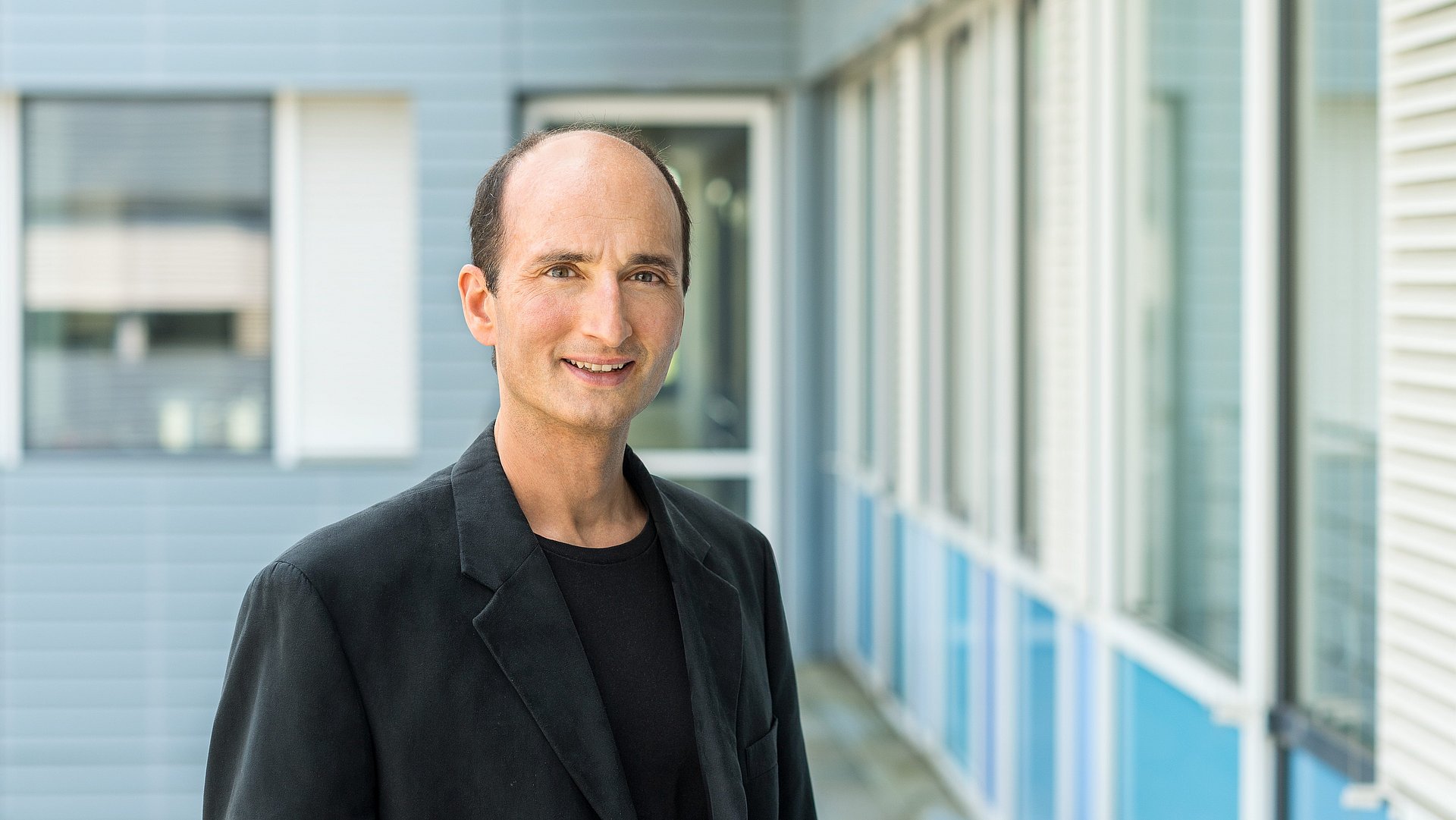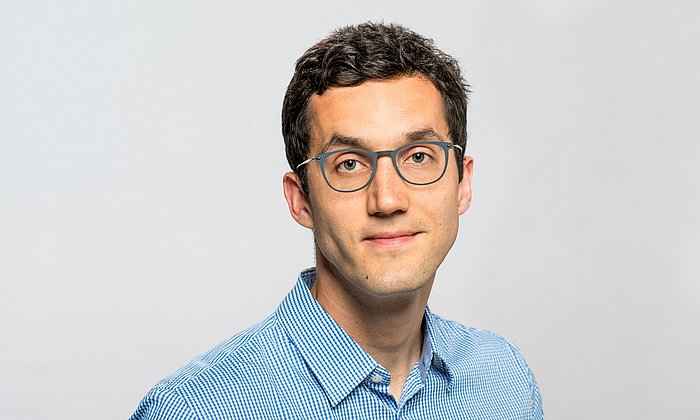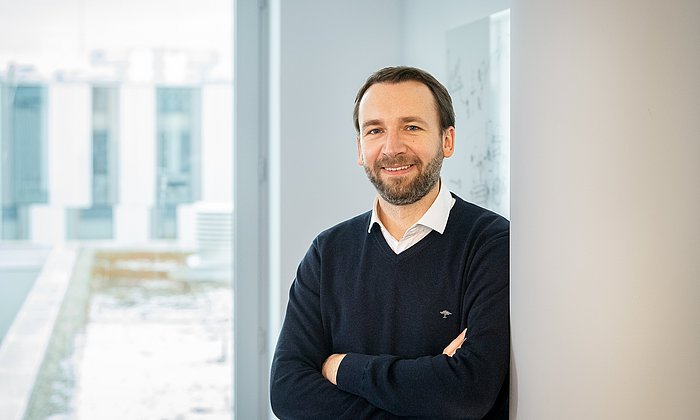Interview with Prof. Daniel Cremers on the future of AI
“The goal of AI is to make our lives easier”

How much contact do we already have with AI in our daily lives?
Today we already deal with AI every day. Whenever we use such hardware devices as a laptop or mobile phone we have points of contact with AI – whether we are unlocking our phone with facial recognition or using language assistant systems.
Those are current examples of AI applications. What developments can we expect in the coming five to ten years?
In most cases, a new development undergoes years of research before the public hears about it. Our research therefore gives us indicators of what technologies are coming. We started working on advanced driver assistance and self-driving around 20 years ago. So I could forsee the coming of autonomous cars. To some extent, they are already here. There will also be autonomous robots and drones. It also seems possible to me that significant advances will be made in translation technologies. For years I have been waiting for the earbud that will translate back and forth between different languages in real time. And it should be able to speak any language in the sound of my own voice.
Which other challenges lie ahead – especially with regard to the impact on society – as AI continues to develop and play an increasing role in everyday life?
AI will have an enormous impact on our society. However, as always such significant changes also stir various fears among people. One example is the specific fear that AI will take away our job. Another relates to the lack of privacy in an AI world. Not everyone wants to become a see-through person, where every action can be tracked and analyzed.
Specifically, what is your view of the influence of AI applications on our working world?
One goal of AI is to take on tasks in order to make our lives easier. It is my hope that AI will help us especially with routine tasks. AI works particularly well in such tasks that involve the monotonous repetition of the same steps. People can then focus on more interesting and varying tasks that are also more challenging. However, there will be social changes where our input will be required to shape and guide them. For example, our society will have to ask what kind of training and qualifications will still be needed in the future? What occupational groups may require retraining? In history, humanity has regularly gone through such transitions and I confident we will manage this.
You talked about the influence on the working world. How will it look in the personal sphere?
In the personal sphere it is crucial for us as a society to agree on appropriate laws and regulations. However, we are living in a globalized world. That means that we do not know whether other countries go along with us – especially because the private sphere is not valued equally everywhere in the world. We face a similar challenge as with the topics of disarmament and climate change. We have to work together with other countries and ensure that a joint agreement is reached that everyone will comply with.
With regard to data protection, Germany takes a highly restrictive approach. Does that involve economic disadvantages?
In the first attempts to regulate AI, the importance of data protection was constantly emphasized. It was argued that personal data should not be shared. The problem is that, when data protection is the sole concern and data sharing is entirely disabled then relevant AI technologies cannot be developed. We have now reached the point where AI can help to detect tumors and other diseases with remarkable accuracy. The main hurdle was to obtain the necessary patient data while complying with all data protection regulations. If the bureaucratic hurdles for accessing data are higher in our country than elsewhere, this will mean that AI technologies can be developed faster in other countries. So we need to assure data privacy, yet we also need to streamline the processes for appropriate data usage and technology development.
Who is using our data to train AI?
There is currently a lot of research and technological development happening both in academia and in industry. For training big neural network models we not only need massive quantities of training data, but also huge amounts of computing power. That means that enormous investments in hardware and compute infrastructure will also be necessary. That is an area where currently academic research lags behind the big corporations. We are therefore very happy that national and Bavarian government are promising significant investments.
What is your overall assessment: is AI just a fad or will it have a lasting impact on our lives?
I don’t think that AI is just a passing fad. I believe that it will have far-reaching effects on our lives in the coming years. Research in AI has been going on for a long time. There have been many phases where nobody believed in the success of this technology. That will not happen again, because we have since witnessed many breakthroughs in AI. In the coming years, it will become increasingly powerful and be deployed across even more areas. My responsibility as an AI researcher is to develop AI technologies that truly serve society and improve our lives and our world.
About Prof. Daniel Cremers:
- Prof. Daniel Cremers heads the Chair of Computer Vision and Artificial Intelligence at TUM.
- He is director of the Munich Data Science Institute) (MDSI). These cross-sectional, integrative research institutes are each dedicated to a scientific field with special technological and social significance. The MDSI conducts research on mathematical, statistical and computer science aspects of data analysis and develops new theories and methods of machine learning and artificial intelligence. These are used to develop applications for the various research fields at TUM such as personalized medicine, life sciences, aerospace engineering, mobility, additive manufacturing, material science, quantum research and climate research.
- Prof. Daniel Cremers is also director of the Munich Center for Machine Learning (MCML). The MCML is a joint initiative of TUM and LMU. The center consists of over 45 research groups and has the goal of furthering foundational research in machine learning with a strong focus on real-world applications. The MCML is one of six National Centers of Excellence for AI Research funded on a permanent level by the German federal government and the state of Bavaria. It is an integral part of the German AI strategy and Hightech Agenda Bavaria.
- Since 2023, Prof. Cremers serves as president of the European Computer Vision.
- Research on artificial intelligence at TUM
- The Chair of Computer Vision and Artificial Intelligence is part of the TUM School of Computation, Information and Technology.
Technical University of Munich
Corporate Communications Center
- Julia Rinner
- julia.rinner@tum.de
- presse@tum.de
- Teamwebsite
Contacts to this article:
Prof. Dr. Daniel Cremers
Technical University of Munich (TUM)
Professor for Computer Vision and Artificial Intelligence
cremers@tum.de



